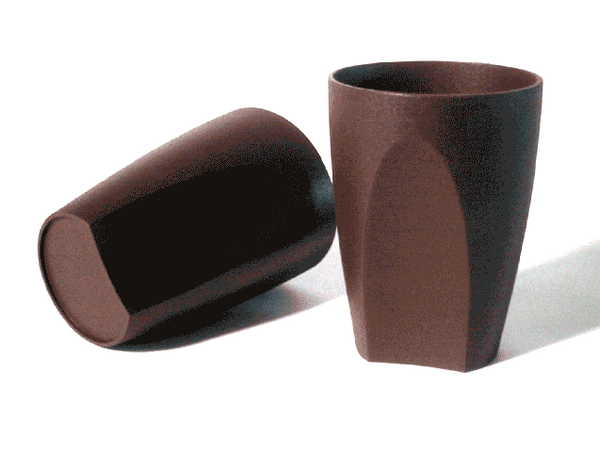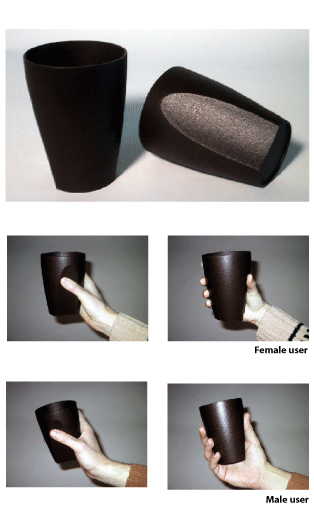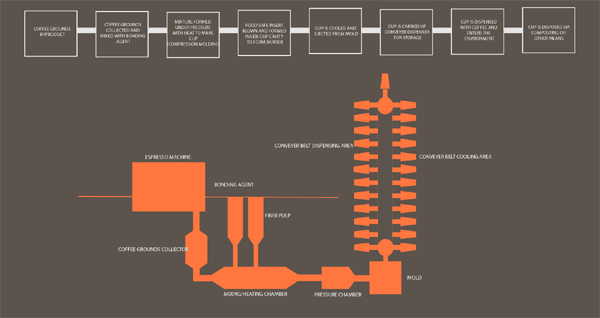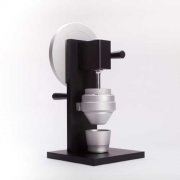C2C coffee cup coffee cups made from coffee grounds
C2c coffee cup by saleem khattak from canada
Designer's own words:
"
In a perfect world, we would not generate waste (I.E. Landfill) or burn fuel unnecessarily (I.E. Shipping), but utilize waste products locally in the perpetual circle of cradle-to-cradle consumption.
As an example, the design team chose the disposable paper cup; the 'C2C' coffee cup is manufactured at the cafe from the waste stream of the cafe.
Used coffee grounds are mixed with paper pulp and a polylactide resin (made from corn derived dextrose), then pressure-molded into shape. C2C is dried and cooled whilst being transported to the place of usage or storage.
The physical design itself originated from the wish of providing not only a directional feature to the cup, but also to provide a friendlier shape and more secure grip for weaker hands. When using a lid-through thoughtful placement-the user will always know where the drinking opening is.
C2C is fully biodegradable with its final elements being 100% compostable.
Manufacturing of C2C provides for an animated feature in the cafe, since most of the process will be visible.
The C2C-Maker would be an under-counter or behind-counter installation, with parts of the machinery being visible and/or exposed; typically, the mold/forming/cooling "tree" would be above counter level.
It would be perfect, if the grounds used for "your" drink would make up "your" cup. However, "your" cup grounds content will actually be from someone else's brew, since there will be a certain cycle delay, when taking mixing, forming, drying, and cooling into consideration. But technically, one brew makes its own cup.
If every cafe has a C2C-Maker, we estimate that the grounds content of C2C will be around 15%, with the remaining 85% being pulp filler and polylactide resin. If the machinery is only installed in high-profile cafes, coffee grounds from other locations may be brought in and utilized, allowing for an estimated 90-95% of the C2C to be coffee grounds; the polylactide resin will then only be required as a binder and sealer.



Important Notice :
前街咖啡 FrontStreet Coffee has moved to new addredd:
FrontStreet Coffee Address: 315,Donghua East Road,GuangZhou
Tel:020 38364473
- Prev

Aluminum alloy structure of HG one grinder professional heavy hand bean mill
It starts with a bean. The bean is crushed and hot water forced through. The results are sometimes good, sometimes bad, and sometimes wonderful. Were chasing something wonderful. In pursuit of wonderful weve gone back to the step between t
- Next

Google Fiber Cloud Coffee Machine
The staff of Google think that there is always something missing in the services they provide. While users enjoy high-quality optical cable network services, they should be accompanied by a cup of mellow and sweet coffee! After a long period of research efforts, Google Fiber researchers finally found a way to combine coffee with fiber optic cable to deliver high-speed, fresh coffee. he
Related
- What is the Philharmonic pressure? How to use Philharmonic pressure to make delicious coffee
- Why does a hand grinder have more fine powder than an electric grinder?
- In addition to the hot mom, what is the difference between the versions of EK43 | ditting and Mahdi ek43?
- What kind of equipment do you need to make coffee by hand? Introduction to novice starter cooking equipment tools
- Espresso needs to be ground how thick and thin scale entry Italian Coffee Machine Bean Grinder investigation and Grinding course
- How much does it cost to open a small private cafe? How much does it cost to learn coffee? How to operate it?
- The difference between the flavor characteristics of hand-brewed coffee and coffee maker is hand-brewed coffee really better than coffee maker? Can I use a coffee machine to make coffee beans by hand?
- The difference between 01 and 02 of hario v60 filter cup what is the difference between 01 and 02 filter cup opening and cooking flavor
- What's the difference between the smart cup and the French kettle? Which is better, the French kettle or the Smart Cup?
- What's the difference between a smart cup and a V60 filter cup? The difference between the taste of smart cup and hand-brewed coffee

